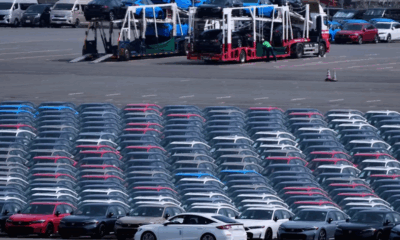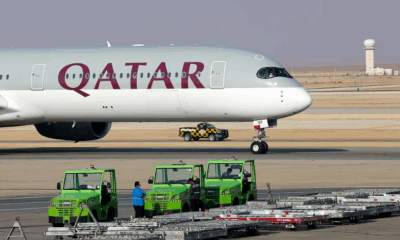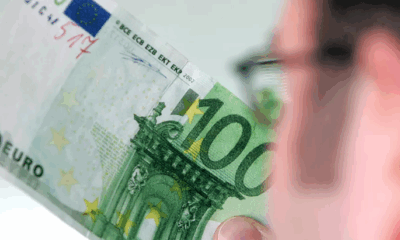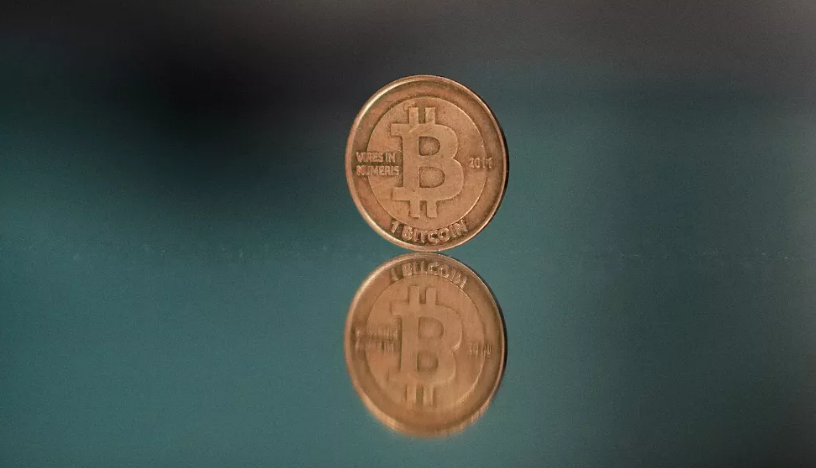Business
Saudi Arabia Strengthens Global Influence with Major Investments and High-Profile Diplomatic Engagements
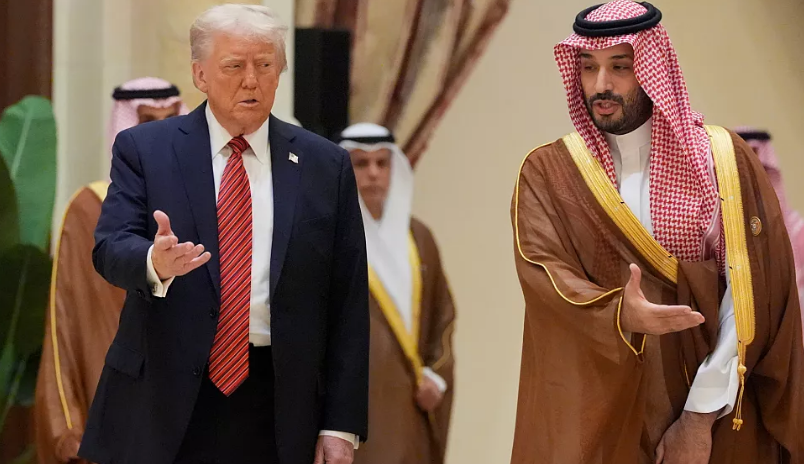
Saudi Arabia is rapidly consolidating its position as a key economic and diplomatic force in the Middle East, attracting billions of dollars in investment from the United States and Europe while forging stronger ties with global powers.
The recent four-day visit by former US President Donald Trump to Saudi Arabia, the UAE, and Qatar underscored Washington’s growing engagement with the region. The trip included high-level meetings and a major investment forum that saw the signing of deals worth over $600 billion across sectors including defence, infrastructure, tourism, mining, and agriculture.
The visit marks a sharp contrast to Trump’s previous official trip to the Kingdom, coming at a time when Saudi Arabia’s Vision 2030 programme is well underway. The ambitious national strategy, launched in 2016, aims to diversify the economy away from oil and drive progress in technology, tourism, and social reform.
Jerry Inzerillo, CEO of the Diriyah Company, said Trump was visibly impressed by the progress made in the Kingdom over the past eight years, particularly in the realm of mega development projects. “It’s a different Saudi Arabia, it’s a different Gulf,” Inzerillo told Euronews, pointing to projects like the $64 billion Diriyah development, which aims to transform a UNESCO World Heritage site into a global cultural and tourism hub by 2030.
Inzerillo emphasized that the Diriyah Project is progressing on time and within budget, covering 14 million square metres and backed by significant private and public investment.
Riyadh, the Kingdom’s capital, is emerging as a regional economic powerhouse, with nearly 600 multinational companies now choosing the city for their regional headquarters. Global giants such as Google, Amazon, Microsoft, BlackRock, Morgan Stanley, and Deloitte have all established a presence as part of Saudi Arabia’s Regional Headquarters (RHQ) programme.
“Riyadh has become the centre of gravity for the Gulf. It’s now a major hub for commerce,” Inzerillo said, noting growing investor confidence in Saudi-led initiatives.
The Kingdom is also deepening partnerships with Europe, welcoming official visits from leaders of France, the UK, and Germany earlier this year. In 2024 alone, Saudi Arabia hosted 109 heads of state, reflecting its rising diplomatic stature.
Beyond real estate and infrastructure, Saudi Arabia is working with over 200 European companies across fields such as design, engineering, culture, and tourism—further signalling its role as a bridge between East and West in an increasingly interconnected global economy.
Business
Japan’s PM Ishiba, Trump Agree on Tariff Talks Amid Trade Tensions
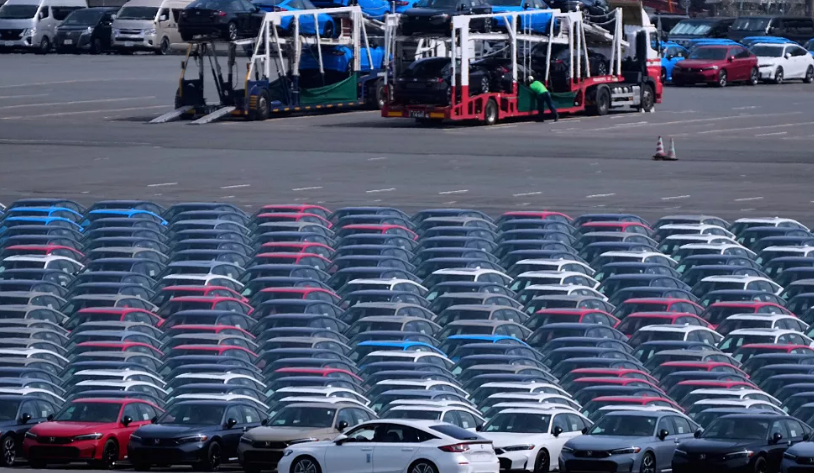
Japanese Prime Minister Shigeru Ishiba announced on Friday that he held a phone call with U.S. President Donald Trump, during which both leaders agreed to pursue “productive” dialogue in upcoming trade negotiations focused on tariffs.
Speaking to reporters after the 45-minute conversation, Ishiba emphasized Japan’s firm stance on recent U.S. tariff measures, reiterating Tokyo’s commitment to encouraging Japanese investment in the United States as an alternative path to addressing economic concerns. “Investment, not tariffs,” Ishiba stated, summarizing his message to the U.S. president.
The conversation between the two leaders took place as Japan’s Economic Revitalisation Minister, Ryosei Akazawa, headed to Washington for the third round of bilateral trade talks. Earlier rounds have ended without significant progress, as the U.S. has resisted Japan’s appeals to remove recently imposed tariffs.
Ishiba said he once again urged the U.S. administration to eliminate all tariffs levied on Japanese imports, particularly those affecting the automotive sector—a pillar of Japan’s export-driven economy. While Trump did not offer a specific response to the request, Ishiba described the overall tone of the conversation as constructive.
The U.S. currently imposes a 25% tariff on imported automobiles, a measure that has drawn criticism from Tokyo for its potential impact on Japan’s industrial output and trade surplus. While some relief has been provided on auto-related duties, tariffs on steel and aluminum remain in effect.
“The discussions were frank, and I expressed my expectations for a productive round of negotiations,” Ishiba said. “We both agreed to continue the dialogue.”
In addition to trade, the two leaders discussed broader geopolitical issues, including security cooperation between Japan and the U.S. and President Trump’s recent visit to the Middle East. Ishiba said both parties reaffirmed their commitment to strengthening the alliance in light of regional security challenges.
Looking ahead, Ishiba confirmed that further talks are planned when both leaders attend the upcoming G7 summit in Canada next month, providing another opportunity to address ongoing trade tensions and diplomatic priorities.
As negotiations resume in Washington, Japan is expected to maintain pressure on the U.S. to roll back protectionist measures while promoting investment-led solutions aimed at preserving the vital trade relationship between the two allies.
Business
Bitcoin Hits New Record High Amid Stablecoin Bill Momentum and Institutional Surge
Business
EU-UK Strike Post-Brexit Deal to Ease Agri-Food Trade and Boost Cooperation

The European Union and the United Kingdom have agreed to a renewed cooperation framework aimed at easing trade tensions and deepening ties, marking the first such post-Brexit deal since the UK’s departure from the EU in 2020. Announced on Monday, the agreement includes provisions to reduce red tape in agri-food trade, a sector that has struggled under Brexit-related barriers.
A key highlight of the deal is the proposal for a Sanitary and Phytosanitary (SPS) agreement, which could significantly reduce the frequency of checks on British animal and plant product exports to the EU. This may also see the UK resume exports of previously restricted items like raw sausages and burgers to the EU for the first time since Brexit.
To benefit from these eased rules, the UK will need to align closely with EU agri-food regulations. While standards remain broadly similar, London has indicated there will be a “short list of limited exceptions” to full dynamic alignment. Oversight of the agreement will rest with the European Court of Justice.
The deal represents a cautious but potentially impactful move toward smoother trade. According to a study by Aston University, such an SPS arrangement could raise UK agri-food exports to the EU by 22.5% and imports from the EU by 5.6%. However, broader economic benefits are expected to be modest, lifting UK GDP by just 0.3% according to the Centre for European Reform.
“This deal isn’t macroeconomically transformative, but it’s highly significant for sectors like farming,” said Charles Grant, director of the Centre for European Reform. “It also sets a precedent—if the UK aligns with EU rules on food standards, similar cooperation could follow in sectors like energy or pharmaceuticals.”
Despite the optimism, experts stress that many practical details are still pending. Businesses, especially small and medium enterprises, are awaiting clarity on how the agreement will work in practice.
“The document outlines a renewed agenda, but much remains unresolved,” said Jill Rutter, senior research fellow at UK in a Changing Europe. “Companies will still need customs support and VAT representatives, as we’re not rejoining the single market or customs union.”
Tom Bradshaw, President of the UK’s National Farmers Union, welcomed the intent of the deal but echoed the call for specifics. “The ambition is welcome, but the detail will be key,” he noted.
Beyond trade, the broader EU-UK cooperation package includes a defence and security partnership, with implications for shared sanctions policy and access to a €150 billion EU-backed defence fund. Analysts say the geopolitical climate, particularly concerns about Russian aggression and shifts in U.S. foreign policy, has helped spur this renewed alignment.
While the immediate economic impact of the agreement may be limited, experts suggest it lays important groundwork for deeper collaboration in critical sectors over the coming years.
-

 Business12 months ago
Business12 months agoSaudi Arabia’s Model for Sustainable Aviation Practices
-

 Business12 months ago
Business12 months agoRecent Developments in Small Business Taxes
-

 Politics12 months ago
Politics12 months agoWho was Ebrahim Raisi and his status in Iranian Politics?
-

 Business11 months ago
Business11 months agoCarrectly: Revolutionizing Car Care in Chicago
-

 Business11 months ago
Business11 months agoSaudi Arabia: Foreign Direct Investment Rises by 5.6% in Q1
-

 Technology12 months ago
Technology12 months agoComparing Apple Vision Pro and Meta Quest 3
-

 Politics12 months ago
Politics12 months agoIndonesia and Malaysia Call for Israel’s Compliance with ICJ Ruling on Gaza Offensive
-

 Sports10 months ago
Sports10 months agoKeely Hodgkinson Wins Britain’s First Athletics Gold at Paris Olympics in 800m

